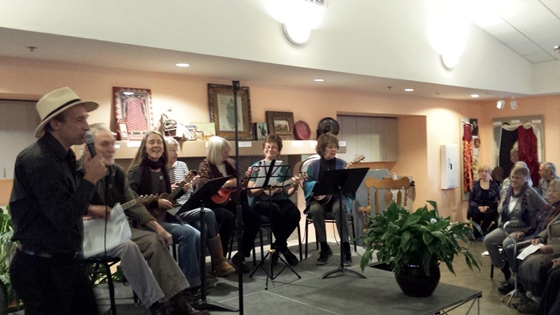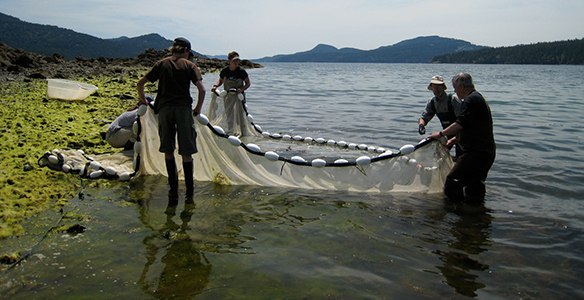||| FROM ELISABETH ROBSON |||
Lately, I’ve been thinking a lot about what life here in San Juan County might look like as life-as-we-know-it crumbles with the ongoing and ever-increasing impacts of ecological breakdown. As the average time between U.S. billion-dollar disasters decreases, from 82 days in the 1980’s to 18 days in 2018-2022 and a record 12 so far in 2023, the more public money is spent recovering from those disasters, and the less money is spent on public services (e.g. public transportation like Washington State Ferries), maintaining infrastructure (e.g. bridges, boats, etc.), and nice-to-have features like robust health care,
rehabilitation services, ecosystem restoration, public land and habitat, and so on. This is true not just here in the U.S. but everywhere. On the whole, we can and should expect quality of life—as measured by services, infrastructure, and nice-to-haves—to decline precipitously in the coming decades.
On November 14, I hosted an online meeting about ecological overshoot and its impacts with presenter Bill Rees, the creator of the ecological footprint analysis, a measurement of our collective footprint in terms of the natural resources humans collectively use each year and the waste products we put back into the environment. As Bill described in his presentation, humanity is well into overshoot—meaning, we are using far more resources than can be regenerated by Earth, and producing far more waste than the Earth can assimilate. Overshoot is like having a checking account and a savings account and using not only all the money in our checking account each year, but also drawing down our savings account. Everyone knows if we spend down our savings account, eventually we’ll run out of money. In ecological terms, eventually we’ll run out of easily-extractable resources and do so much damage from the pollution we’ve created, life-as-we-know it will cease to exist.
Because we’re already far into overshoot, we are degrading the carrying capacity of Earth for all of life, including ourselves. We can see this in the habitat lost to development; pervasive pollution all around the Earth, including PFAS in the rain, micro plastics in our blood and brains, and dioxins in every mother’s breast milk; the rapid loss of topsoil due to industrial agriculture; deforestation—a football field of forest lost every single second, 24 hours a day; fewer fish in the ocean; ever increasing parts per million of carbon dioxide and methane in the atmosphere…the list is long.
Ecological overshoot is obvious here in San Juan County. Our county is massively over-populated when measured by how many people this land and its surrounding waters could sustain without industrial
civilization. The resources we consume are almost entirely all brought in from the mainland, and if those connections were cut—if the ferries ceased to function, if the electricity lines were severed, if the barges
bringing in oil and propane stopped coming—only a small fraction of the current population of 19,000 or so could survive beyond a few weeks, much less months or years, living on the resources here. We here in SJC are the living embodiment of ecological overshoot.
As Bill noted in his presentation this week, the prevailing global narrative of continuous economic growth, consumption, and wealth bears little relationship to the biophysical and social realities it purports to represent. Bill is a population ecologist and ecological economist, and so he knows what he is talking about when describing the predicament of ecological overshoot we’ve created, and we should listen—carefully—when he says we should expect a major economic contraction and population correction by century’s end.
So far, I’ve seen no indication that this county is preparing for the kind of future Bill so compellingly laid out in his presentation—compelling because it is obviously true, not because it will be fun or easy. As he
pointed out, we humans are not cognitively equipped to deal with the global ecological crisis and so our lack of preparation will make the decline of life-as-we-know-it much more difficult than it needs to be, and filled with more suffering than we can possibly imagine now. It is obvious we are not cognitively equipped to deal with the global ecological crisis because we barely discuss it, much less prepare for it.
A companion yardstick for measuring human overshoot of Earth’s carrying capacity is the planetary boundaries framework. This framework identifies nine processes that are critical for maintaining the
stability and resilience of the Earth system as a whole. The framework tracks by how much we’ve transgressed beyond a safe operating space for the nine processes: climate change, land system change, freshwater change, biogeochemical flows, ocean acidification, atmospheric aerosol loading, stratospheric ozone depletion, and novel entities such as micro plastics, endocrine disruptors, and organic pollutants.
Six of the nine boundaries are transgressed, and of those, five are in the high risk zone. By far the boundary we’ve transgressed furthest is biosphere integrity—much more so than climate change. This is perhaps not surprising given that humans and our livestock make up 96% of the weight of land mammals and wildlife a mere 4%, and that the accumulated weight of all human stuff on the planet now weighs more than all living beings—flora and fauna combined—on Earth.
It is absolutely clear that ecological overshoot is a dire emergency and yet I hear no conversations about this emergency in any policy, planning, or environmentally-focused documents I read or meetings I
attend in the county (I don’t attend them all, so perhaps I’m missing some!). These are the most important conversations we should be having at all levels of human society—in small communities like ours, in our county government, and on up to the state and federal level and beyond.
Everyone’s talking about climate change—as we should; it’s an incredibly dire problem—but no one is talking about ecological overshoot, of which climate change is just one of many symptoms. We here in San Juan County have no control over what happens globally; almost no control over what happens in this country; very little control over what happens in the state, but we do have some control over what happens here in the county and in our local communities.
Why are we not talking about this? Why are we not preparing for the “major economic contraction and population correction” that is coming as Bill Rees described and should be obvious to anyone who studies ecological overshoot? Why is this county still making plans and policies based on the fantasy of infinite economic growth and a “green transition” that will do nothing to mitigate ecological overshoot, and indeed will likely make it worse?
Perhaps most important of all, no one is talking about how we cut back; how we learn how to live with less. Less energy; fewer ferries; fewer tourists; a higher cost of living meaning fewer services, crumbling
infrastructure, and less income for food, water, heat, and shelter. We must face reality: the reality of ecological overshoot, and the reality that we are not prepared. We aren’t even having the right conversations.
My goal in hosting this series is to help stimulate more conversations in San Juan County; conversations about ecological overshoot and its ongoing and worsening impacts—including but not limited to climate change—we are already experiencing and will continue to experience here in the county.
Bill’s presentation was the first of three about Ecological Overshoot. If you missed his presentation you can watch it on YouTube here:
All presentations begin at 5:30pm PT on Zoom: https://zoomto.me/iDprp. I hope you’ll join us.









This is a fantastic conversation to be having.
I’m interested in what can be done (and who may already be doing it) to address food sovereignty and resilience in the county. I’d love to hear about any other similar ongoing conversations, resources, or individuals.
Thank you for arranging these talks.
Seems like a good argument for population control, and a shift from our capitalistic society… but we can’t talk about that can we?
Michael, these are difficult subjects for sure, but we must talk about them.
This may be the sanest piece of writing I’ve seen in many years. Thank you Elisabeth (and Lin!) for breaching the dike in “We don’t discuss (that obvious problem) in polite company”!
I do not speak for him (obviously) but I believe, MJ was being sarcastic… And, of course, we MUST talk about these difficult subjects: human population, the ‘religion’ of Progress, corporate capitalism, ecological carrying capacity, etc.
Joshua – I urge you to consider joining the Orcas Community Participatory Agriculture program: https://www.orcascommunityag.org/ The best answer to despair is pulling weeds with friends!
US Census Bureau estimates that world population reached 2 billion in 1927. Last year UN related that world population reached 8 billion. A fourfold increase in 95 years. Unsustainable and the driver of all the ills discussed.
We have one child. 1/2 = .05 replacement. Our child has elected to have no children 1/0 = 0. We will cease to be in approximately 40 years, but are determined to live as well as we can during the decline. The rest of you can chart your own course.
That’s the best we can offer